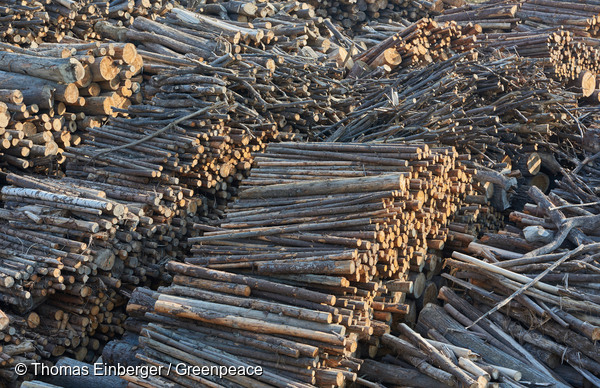In a review of legislation to combat illegal logging, the European Commission has said EU countries must significantly step up efforts to keep illegal timber off the EU market [1].
 The Commission’s assessment of the EU timber regulation (EUTR) said EU countries should “significantly step up their implementation and enforcement efforts”. It blamed them for failing to allocate sufficient human and financial resources and for uneven sanction regimes across EU member states and “a lack of uniform understanding and application of the regulation”.
The Commission’s assessment of the EU timber regulation (EUTR) said EU countries should “significantly step up their implementation and enforcement efforts”. It blamed them for failing to allocate sufficient human and financial resources and for uneven sanction regimes across EU member states and “a lack of uniform understanding and application of the regulation”.
It added that private sector companies had “not consistently implemented the [due diligence] requirements” and that compliance remains “uneven and insufficient”. Finally, the Commission also said that it may consider expanding the scope of the EUTR to include timber products such as printed paper, wooden seats, coffins and musical instruments, which are not currently covered.
Greenpeace EU forest policy director Sébastien Risso said: “Illegal logging and the trade in illegal timber have severe environmental and social impacts. They also feed corruption and organised crime. It beggars belief that after decades of debate, and despite a strong law that could prevent it, the proceeds of these crimes are still sold in Europe. European ministers must reaffirm their commitment to protect forests and enforce existing EU laws banning illegal timber trade from European markets.”
Investigations by Greenpeace over the past two years have shown that weak enforcement of the EUTR and non-compliance by European companies, as well as delays in implementation by EU countries, are undermining the effectiveness of the law. This is seriously slowing down Europe’s fight against illegal logging and its associated trade [2].
The EU should lead the global fight against deforestation, said Greenpeace. It should vigorously enforce the EUTR, strengthening and implementing measures foreseen in the 2003 EU action plan to fight illegal logging, and adopting new far reaching measures to protect forests and eliminate deforestation from agriculture supply chains [3].
The Dutch Presidency of the EU is also likely to hold a discussion on EU action to tackle illegal logging at the agriculture Council on 10 May [4]. It said it “will strive for a more effective, coherent approach that will also strengthen efforts to halt deforestation” [5].
Notes:
[1] https://www.greenpeace.org/static/planet4-eu-unit-stateless/2018/08/eutr_implementation_report.pdf.
[2] Greenpeace (February 2016), Europe failing to use legal armoury against illegal logging: http://www.greenpeace.org/eu-unit/en/News/2016/Europe-failing-to-use-legal-armoury-against-illegal-logging.
[3] Alongside the assessment of the EUTR, the European Commission is undertaking a review of the Forest Law Enforcement Governance and Trade (FLEGT) Action Plan. European environment commissioner Karmenu Vella recently announced that the Commission would also look into policy options to address deforestation in 2016. In a joint-statement made during the Paris Climate Conference, France, Germany, Denmark, the Netherlands and the UK stressed the need to eliminate deforestation from agriculture supply chains and urged the Commission to release a roadmap for EU action.
[4] The draft Council agenda was published on the website of the Danish Parliament: https://www.greenpeace.org/static/planet4-eu-unit-stateless/2018/08/cb1e65ad-cb1e65ad-1585667.pdf.
Contacts:
Sébastien Risso – Greenpeace EU forests policy director: +32 (0)496 127 009, [email protected]
Greenpeace EU press desk: +32 (0)2 274 1911, [email protected]
For breaking news and comment on EU affairs: www.twitter.com/GreenpeaceEU
